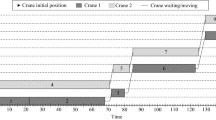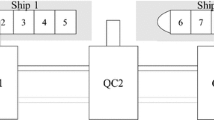Abstract
This study investigates a quay crane scheduling problem with considering the impact of tides in a port and fuel consumption of ships. A mixed-integer nonlinear programming model is proposed. Some nonlinear parts in the model are linearized by approximation approaches. For solving the proposed model in large-scale problem instances, both a local branching based solution method and a particle swarm optimization based solution method are developed. Numerical experiments with some real-world like cases are conducted to validate the effectiveness of the proposed model and the efficiency of the proposed solution methods.





Similar content being viewed by others
References
Bierwirth C, Meisel F (2009) A fast heuristic for quay crane scheduling with interference constraints. J Sched 12(4):345–360
Bierwirth C, Meisel F (2010) A survey of berth allocation and quay crane scheduling problems in container terminals. Eur J Oper Res 202(3):615–627
Chen JH, Lee DH, Goh M (2014) An effective mathematical formulation for the unidirectional cluster-based quay crane scheduling problem. Eur J Oper Res 232(1):198–208
Daganzo CF (1989) The crane scheduling problem. Transp Res Part B 23(3):159–175
Diesel MAN, Turbo S (2004) Basic principles of ship propulsion. http://www.manbw.com/files/news/filesof3859/P254-04-04.pdf. Accessed 2015.09.10
Du Y, Chen Q, Quan X, Long L, Fung RY (2011) Berth allocation considering fuel consumption and vessel emissions. Transp Res Part E 47(6):1021–1037
Du Y, Chen Q, Lam JSL, Xu Y, Cao JX (2015) Modeling the impacts of tides and the virtual arrival policy in berth allocation. Transp Sci 49(4):939–956
Eberhart RC, Kennedy J (1995) A new optimizer using particle swarm theory. Proceedings of the sixth international symposium on micro machine and human science, vol 1, pp 39–43
Fagerholt K (2004) A computer-based decision support system for vessel fleet scheduling experience and future research. Decis Support Syst 37(1):35–47
Fischetti M, Lodi A (2003) Local branching. Mathematical programming 98(1–3), 23–47
Golias MM, Saharidis GK, Boile M, Theofanis S, Ierapetritou MG (2009) The berth allocation problem: optimizing vessel arrival time. Marit Econ Log 11(4):358–377
Guo P, Cheng W, Wang Y (2014) A modified generalized extremal optimization algorithm for the quay crane scheduling problem with interference constraints. Eng Optim 46(10):1411–1429
Hu QM, Hu ZH, Du Y (2014) Berth and quay-crane allocation problem considering fuel consumption and emissions from vessels. Comput Ind Eng 70:1–10
Kim KH, Park YM (2004) A crane scheduling method for port container terminals. Eur J Oper Res 156(3):752–768
Lee DH, Wang HQ, Miao L (2008) Quay crane scheduling with non-interference constraints in port container terminals. Transp Res Part E 44(1):124–135
Legato P, Trunfio R, Meisel F (2012) Modeling and solving rich quay crane scheduling problems. Comput Oper Res 39(9):2063–2078
Letchford AN, Lodi A (2003) An augment-and-branch-and-cut framework for mixed 0–1 programming. Combinatorial optimization—Eureka. Springer, Berlin Heidelberg, pp 119–133
Lim A, Rodrigues B, Xu Z (2007) A m-parallel crane scheduling problem with a non-crossing constraint. Nav Res Log 54(2):115–127
Liu J, Wan YW, Wang L (2006) Quay crane scheduling at container terminals to minimize the maximum relative tardiness of vessel departures. Nav Res Log 53(1):60–74
Liu Z, Wang S, Chen W, Zheng Y (2016) Willingness to board: a novel concept for modeling queuing up passengers. Transp Res Part B 90:70–82
Meisel F, Bierwirth C (2011) A unified approach for the evaluation of quay crane scheduling models and algorithms. Comput Oper Res 38(3):683–693
Meng Q, Wang S, Andersson H, Thun K (2013) Containership routing and scheduling in liner shipping: overview and future research directions. Transp Sci 48(2):265–280
Moccia L, Cordeau JF, Gaudioso M, Laporte G (2006) A branch-and-cut algorithm for the quay crane scheduling problem in a container terminal. Nav Res Log 53(1):45–59
Ng WC, Mak KL (2006) Quay crane scheduling in container terminals. Eng Optim 38(6):723–737
Peterkofsky RI, Daganzo CF (1990) A branch and bound solution method for the crane scheduling problem. Transp Res Part B 24(3):159–172
Port of Antwerp (2016) Accessed Aprial 17, 2016. https://www.hafen-hamburg.de/en
Qureshi AG, Taniguchi E, Yamada T (2009) An exact solution approach for vehicle routing and scheduling problems with soft time windows. Transp Res Part E 45(6):960–977
Rakke JG, Christiansen M, Fagerholt K, Laporte G (2012) The traveling salesman problem with draft limits. Comput Oper Res 39(9):2161–2167
Ronen D (1982) The effect of oil price on the optimal speed of ships. J Oper Res Soc 33:1035–1040
Ronen D (2011) The effect of oil price on containership speed and fleet size. J Oper Res Soc 62(1):211–216
Shi Y, Eberhart R (1998) A modified particle swarm optimizer. IEEE world congress on computational intelligence, pp 69–73
SHMSA (2016) Accessed April 16, 2016. http://www.Shmsa.gov.cn
Song JH, Furman KC (2013) A maritime inventory routing problem: practical approach. Comput Oper Res 40(3):657–665
Tavakkoli-Moghaddam R, Makui A, Salahi S, Bazzazi M, Taheri F (2009) An efficient algorithm for solving a new mathematical model for a quay crane scheduling problem in container ports. Comput Ind Eng 56(1):241–248
Tawarmalani M, Sahinidis NV (2004) Global optimization of mixed-integer nonlinear programs: a theoretical and computational study. Math Program 99(3):563–591
Ting CJ, Wu KC, Chou H (2014) Particle swarm optimization algorithm for the berth allocation problem. Expert Syst Appl 41(4):1543–1550
Wang S, Meng Q (2011) Schedule design and container routing in liner shipping. Transp Res Rec 2222:25–33
Wang S, Meng Q (2012) Sailing speed optimization for container ships in a liner shipping network. Transp Res Part E 48(3):701–714
Wang S, Zheng J, Zheng K, Guo J, Liu X (2012) Multi resource scheduling problem based on an improved discrete particle swarm optimization. Phys Proc 25:576–582
Xu D, Li CL, Leung JYT (2012) Berth allocation with time-dependent physical limitations on vessels. Eur J Oper Res 216(1):47–56
Zhen L (2015) Tactical berth allocation under uncertainty. Eur J Oper Res 247:928–944
Zhen L (2016) Modeling of yard congestion and optimization of yard template in container ports. Transp Res Part B 90:83–104
Zhen L, Xu Z, Wang K, Ding Y (2016) Multi-period yard template planning in container terminals. Transp Res Part B. doi:10.1016/j.trb.2015.12.006
Zhu Y, Lim A (2006) Crane scheduling with non-crossing constraint. J Oper Res Soc 57(12):1464–1471
Acknowledgments
The authors would like to thank anonymous reviewers for their valuable comments and constructive suggestions, which have greatly improved the quality of this paper. This research is supported by the National Natural Science Foundation of China (71422007), Shanghai Social Science Research Program (2014BGL006).
Author information
Authors and Affiliations
Corresponding author
Rights and permissions
About this article
Cite this article
Yu, S., Wang, S. & Zhen, L. Quay crane scheduling problem with considering tidal impact and fuel consumption. Flex Serv Manuf J 29, 345–368 (2017). https://doi.org/10.1007/s10696-016-9248-4
Published:
Issue Date:
DOI: https://doi.org/10.1007/s10696-016-9248-4




